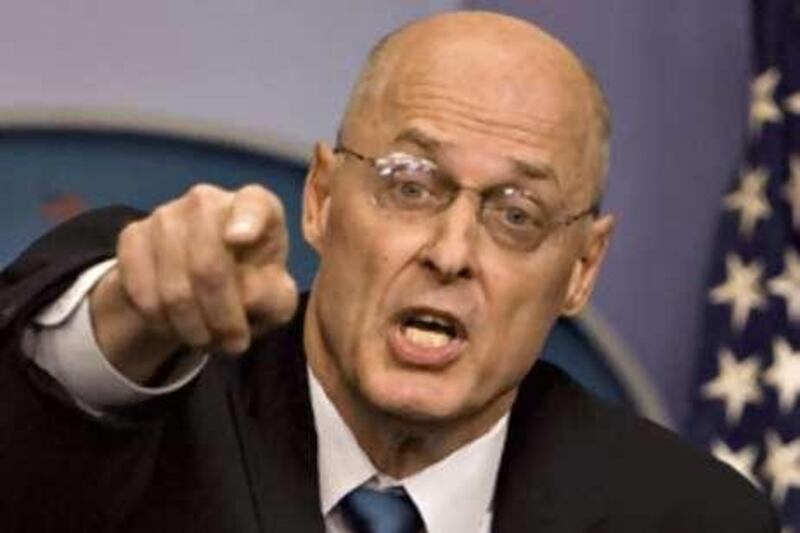What's a good Chinese technocrat to do? You spend half your career sipping tea in tiny cubicles trying to figure out ways to keep the Americans happy. They demand you deregulate your financial sector, so you allow foreigners a 49 per cent stake in brokerage firms, only for Merrill Lynch to insist on majority ownership. They make largely empty threats of retaliation if you don't allow your currency, the yuan, to appreciate. So to give them face - and to squeeze out your own historically high inflation rates - you manage a nine per cent revaluation against the dollar and nearly twice that against the Japanese yen.
You liquidate government stakes in large enterprises to make your economy more transparent and competitive, but then the US government says you need to reform your capital markets. And when you finally get around to doing that, it warns you against a bailout of stock investors. And then one morning, while surfing the handful of internet news sites that aren't blocked by government censors, you learn the US Treasury Department is saving America's two largest mortgage companies from bankruptcy at a potential cost to taxpayers of more than US$100 billion (Dh367bn). So who's socialising risk now?
China owns some $376bn of debt issued by Fannie Mae and Freddie Mac, the quasi-public corporations Washington is effectively nationalising. So any rescue package had better make explicit what had been an implicit guarantee of their obligations. Never fear, you tell yourself. Surely your central bank governor, Zhou Xiaochuan, and the vice premier, Wang Qishan - or "Batman and Robin", as they are known in China technocrat nerd-code - have called the US treasury secretary, Henry Paulson, for an explanation.
After all, this comes at a bad time for China, despite its meteoric growth and enormous foreign exchange reserves. Those treasury bills Beijing keeps buying to keep the US government solvent are a lot more expensive when converted from dollars into a much stronger yuan, and there are rumours the central bank is appealing to the finance ministry for an infusion of capital. Uncle Sam is not as easy to carry as he used to be.
You imagine what that phone call between Mr Paulson and the Dynamic Duo must have been like: Mr Zhou: Mr Secretary, we very much appreciate your periodic trips to China to instruct us about the proper ways of economic liberalisation. Mr Wang: Yes, long live the invisible hand ? Mr Zhou: But as I'm sure you can appreciate, this doesn't look good. First, you bailed out your airlines after September 11. Then there was the Morgan Stanley and Bear Stearns deal, and now your troubled auto makers are looking for subsidised loans to finance the development of energy-efficient cars. What's next? It's difficult for our people to endure the short-term pain of free-market reform when they see the world's largest capitalist government behaving like an Albanian farm collective.
Mr Wang: The Shanghai stock exchange has plunged 64 per cent over the last 12 months. That's a lot of creative destruction. We're taking a beating in the blogosphere. Mr Zhou: We understand the need for the occasional bailout. Back in the old days, we used to issue them all the time for companies like The No 6 "Go Tell the Army" Autoworks and Noodle Factory. But as you know, such extravagance eventually catches up with you.
Mr Wang: And it's not like we don't have our own problems. Our economy is expected to grow by only nine per cent this year. Should it continue to slow down, our markets for your John Deer tractors and microprocessors will dry up, no matter how much weaker the dollar is against the yuan. Mr Zhou: And if America loses its Triple-A sovereign debt rating, what then? Where should we invest our $1.8 trillion in foreign reserves? Credit rating agencies insist the Freddie/Fannie bailout will not affect America's rating, but we're not so sure. Last week, the cost of insuring US Treasuries against government default hit a record level.
Mr Wang: And what other US assets are available to us? Whenever a Chinese company or investment fund bids for a high-profile US asset, there's a Sinophobic backlash? Mr Zhou: Your right-wing radio hosts call us "Chicoms". That's so Great Leap Forward. Mr Wang: So I'm sure you'll understand, Mr Secretary, that we fully expect our interests to be protected as you go about nationalising what's left of your privately owned economy. And we'd like you to be frank with us: is there anything else we need to know about?
(Pause.) Mr Paulson: I can get you General Motors at 30 cents on the dollar. (Pause.) Messrs Wang and Zhou: We'll get back to you on that, Mr Secretary. sglain@thenational.ae





